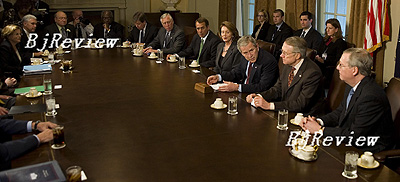|

During the latter half of the year 2007, bad news about the U.S. economy would not stop coming. The subprime mortgage crisis appeared to be the most popular topic of conversation among economists around the world. The country's unemployment rate jumped to a two-year high. And consumers faced a credit crisis and an ongoing downturn in the housing market.
Then on New Year's Day crude oil prices exceeded the psychological benchmark of $100 per barrel. After this, the U.S. stock markets slid rapidly, triggering reverberations in stock markets in Asia and Europe.
Economists and analysts are now debating whether or not the U.S. economy-the world's largest-has entered a recession. In the meantime, they do agree that if the U.S. economy shrinks much further, negative reverberations will be felt throughout the global economy.
At the World Economic Forum in Davos, Switzerland, in late January, many economists, including American ones, said the U.S. economy had entered a recession. Nouriel Roubini, an economics professor of New York University, said the U.S. economy had started to shrink as of last December. Stephen Roach, Chairman and Chief Executive Officer of Morgan Stanley Asia based in Hong Kong, noted that the United States had to face the fact that its economy had started entering a recession. Dominique Strauss-Kahn, Managing Director of the International Monetary Fund, also pointed out that American economic growth had slowed down.
Chinese scholars and economists have different opinions on this matter. Zhen Bingxi, a senior research fellow at the China Institute of International Studies, said that no authoritative institute to date had declared that the U.S. economy had entered a recession, because there were different ways of measuring recessions.
"At present, we can only say that there are more and obvious indications that show the U.S. economy is sliding toward recession," Zhen said.
In the past, the standard definition of a recession was a period of at least two consecutive quarters where the economy had contracted. Since 2001, the U.S. National Bureau of Economic Research (NBER), a non-government organization of economists, has used another definition of recession that takes into account real gross domestic product (GDP), real income, employment, industrial production and wholesale-retail growth. If these factors are found to have prompted a significant decline in economic activity that has lasted more than a few months, then a country's economy is said to be in a recession. By the NBER's measure, the last U.S. recession was from March to November 2001.
Zhen said the most obviously depressed part of the U.S. economy was the real estate sector, which has seen negative growth over the last six to seven quarters. But he also pointed out that real estate accounts for only about 10 percent of America's GDP.
"A recession in one or two aspects will not really hurt the vigor of the U.S. economy," Zhen said.
He also noted that even if the U.S. economy did enter a recession, it would not be noted until five to six months later after economists had time to collect statistics and make comprehensive measurements.
"Unless there are accurate figures to prove it, I will not say that the U.S. economy has started recessing," Zhen said, adding that two other factors already appear to point in that direction. First, the U.S. unemployment rate rose to a two-year high of 5 percent in December 2007 from 4.7 percent in November. Second, the country's consumer spending rate was minus 0.4 percent in December 2007.
Sink or swim
Wang Guoxing, Executive Deputy Director and research fellow at the Pudong Institute for the U.S. Economy, said that there was a slight possibility that the American economy would sink into recession. He pointed out that the country's trade and budget deficits had decreased during the last two years. Another factor was that U.S. Congress had implemented new currency and financial policies that have proved effective. Wang also said he believed that the negative effects of the subprime mortgage crisis would end in the first quarter of 2008.
Zhen emphasized that the first quarter of this year would be very crucial for the U.S. economy. If statistics indicate that it has not continued sliding during the first quarter, the country would generally recover from the effects of the subprime mortgage crisis and could even start growing again in the second half of this year, he said. | 